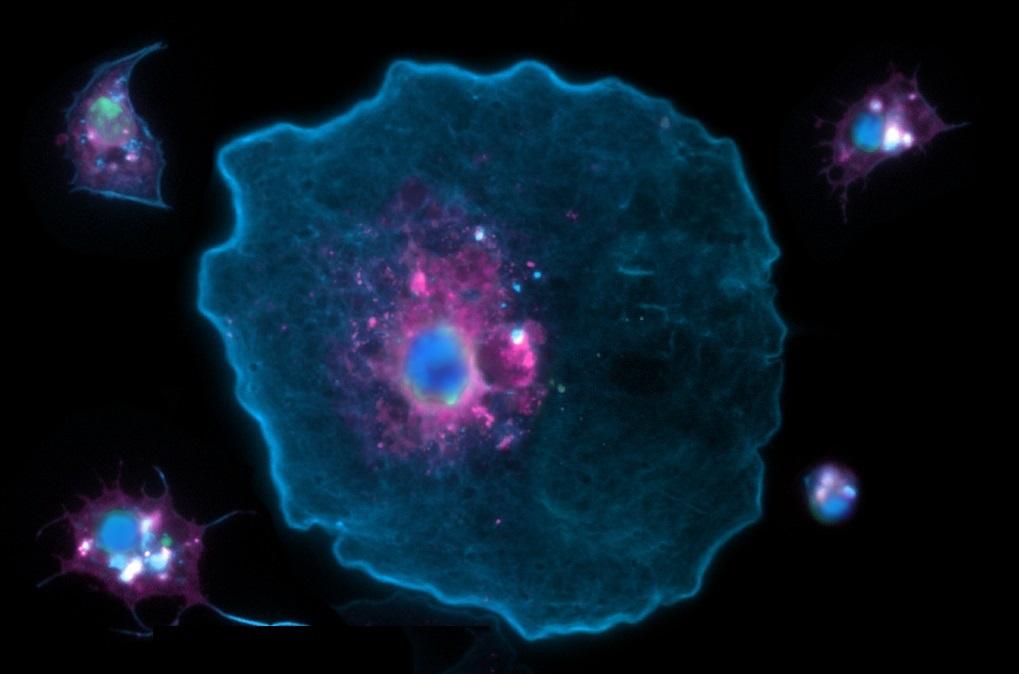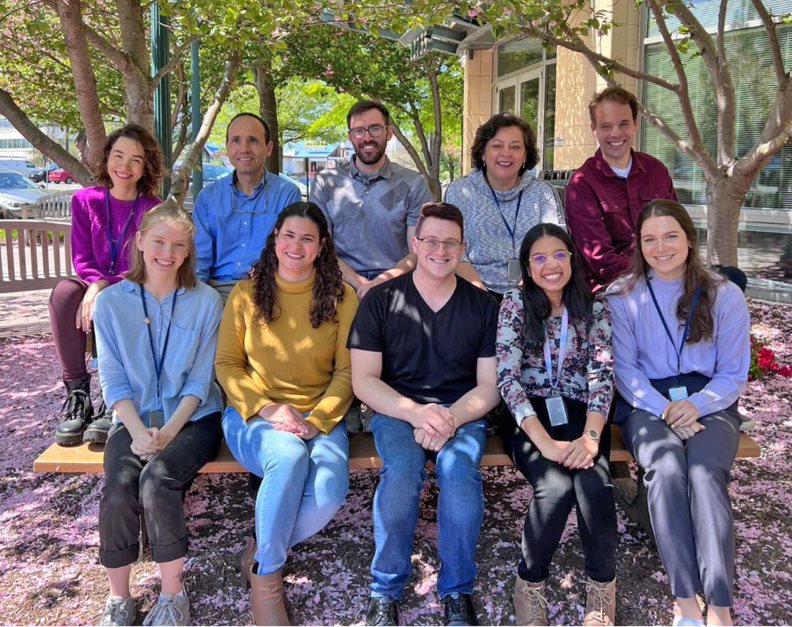Mosquito Immunity and Vector Competence Section
Established in 2003
Carolina Barillas-Mury, M.D., Ph.D.
Chief, Laboratory of Malaria and Vector Research
Distinguished Investigator Head, Mosquito Immunity and Vector Competence Section

Major Areas of Research
- Mosquito immune responses that limit Plasmodium infection.
- Plasmodium evasion of the mosquito immune system.
- Hemocyte differentiation and immune memory in mosquitoes.
- Mosquito antiviral immunity and susceptibility to dengue infection.
Program Description
The Mosquito Immunity and Vector Competence Section investigates the interactions between the mosquito immune system and Plasmodium parasites to understand how they affect malaria transmission.
Listen to an interview with Dr. Barillas-Mury on National Public Radio: The Cure for Malaria Could Be in a Mosquito's Gut
The Lock and Key Theory

We can think of Plasmodium falciparum Pfs47 surface protein as a “key” that allows the parasite to “turn off” the mosquito immune system by interacting with a midgut receptor, “the lock”. The parasite needs a Pfs47 haplotype compatible with the midgut receptor of a given mosquito species to evade the mosquito immune system and survive
The human malaria parasite Plasmodium falciparum originated in Africa but became global as humans migrated around the world. It is now transmitted by more than 50 different species of anopheline mosquitoes and causes the most virulent form of malaria. We found that the surface protein Pfs47 makes parasites “invisible” to the mosquito immune system. We proposed the “lock-and-key theory” of malaria globalization, in which we think of Pfs47 as a “key” that interacts with a mosquito receptor (the lock) and this allows the parasite to “turn off” the mosquito detection system. There are different versions (haplotypes) of this key, and the parasite needs to have the right Pfs47 haplotype (Hap) for the “lock” present in the mosquito species it has infected, to avoid elimination by the mosquito immune system. This facilitates malaria transmission, and the establishment of a local transmission cycle. The Pfs47 receptor has been identified in the gut of different mosquito species (shown as circles with different colors). Our studies suggest that Pfs47-mediated evasion of the mosquito immunity was critical for malaria globalization and may be a key target to disrupt disease transmission.
Mosquito cellular immunity at single-cell resolution

There are three types of mosquito hemocytes, the equivalent of vertebrate leukocytes, based on their morphology. Prohemocytes are precursor cells, granulocytes are involved in phagocytosis and microvesicle release, and oenocytoids mediate melanization responses. We recently characterized a new subpopulation of giant mosquito granulocytes, the Megacytes (large cell in the center), and show that they are key mediators of mosquito immunity against bacteria and Plasmodium.
In collaboration with the Wellcome Sanger Institute, we used single cell RNA sequencing (scRNA-seq) to analyze the transcriptional profiles of individual mosquito immune cells (hemocytes) in response to blood feeding or infection with Plasmodium. The transcriptional profile of 8506 hemocytes of Anopheles gambiae and Aedes aegypti, mosquito vectors of human malaria and viral infections respectively, revealed the functional diversity of these immune cells. A new cell type, much larger than all other hemocytes, that we termed megacyte was identified in A. gambiae. Besides their large size, megacytes also express a unique transmembrane protein marker (TM7318), as well as high levels of LPS-Induced TNF-alpha transcription factor 3 (LL3). We identified and validated two main hemocyte lineages and found evidence of proliferating granulocyte populations. This atlas of medically relevant invertebrate immune cells at single cell resolution identified key cells populations that mediate mosquito immune responses to malaria infection.
Biography
Education
Ph.D., University of Arizona
M.D., Universidad Francisco Marroquin de Guatemala
B.S., Universidad del Valle de Guatemala
Dr. Barillas received her B.S. in biology from “Universidad del Valle de Guatemala”, her M.D. from “Universidad Francisco Marroquin de Guatemala” and her Ph.D from the University of Arizona. She did her post-doctoral training in Prof. Fotis Kafatos laboratory at Harvard University and at the European Molecular Biology Laboratory in Germany. She was an assistant professor at Colorado State University, and joined NIH in 2003. She became Senior Investigator in 2010 and NIH Distinguished Investigator in 2016. She heads the Mosquito Immunity and Vector Competence Section and is Chief of the Laboratory of Malaria and Vector Research. She investigates the interactions between the mosquito immune system and Plasmodium parasites critical for malaria transmission, with the ultimate goal of disrupting the parasite’s life cycle and prevent human disease. Dr. Barillas-Mury received the 2010 Bailey K. Ashford Medal, from the American Society of Tropical Medicine and Hygiene, the 2013 Sanofi/Pasteur Award in Tropical and Neglected Diseases and was elected member of the National Academy of Sciences in 2014 and of the of the National Academy of Medicine in 2021.
Selected Publications
Gomes FM, Tyner MDW, Barletta ABF, Saha B, Yenkoidiok-Douti L, Canepa GE, Molina-Cruz A, Barillas-Mury C. Double peroxidase and histone acetyltransferase AgTip60 maintain innate immune memory in primed mosquitoes. Proc Natl Acad Sci U S A. 2021 Nov 2;118(44):e2114242118.
Raddi G, Barletta ABF, Efremova M, Ramirez JL, Cantera R, Teichmann SA, Barillas-Mury C, Billker O. Mosquito cellular immunity at single-cell resolution. Science. 2020 Aug 28;369(6507):1128-1132.
Molina-Cruz A, Canepa GE, Kamath N, Pavlovic NV, Mu J, Ramphul UN, Ramirez JL, Barillas-Mury C. Plasmodium evasion of mosquito immunity and global malaria transmission: The lock-and-key theory. Proc Natl Acad Sci U S A. 2015 Dec 8;112(49):15178-83.
Molina-Cruz A, Garver LS, Alabaster A, Bangiolo L, Haile A, Winikor J, Ortega C, van Schaijk BC, Sauerwein RW, Taylor-Salmon E, Barillas-Mury C. The human malaria parasite Pfs47 gene mediates evasion of the mosquito immune system. Science. 2013 May 24;340(6135):984-7.
Oliveira Gde A, Lieberman J, Barillas-Mury C. Epithelial nitration by a peroxidase/NOX5 system mediates mosquito antiplasmodial immunity. Science. 2012 Feb 17;335(6070):856-9.
Rodrigues J, Brayner FA, Alves LC, Dixit R, Barillas-Mury C. Hemocyte differentiation mediates innate immune memory in Anopheles gambiae mosquitoes. Science. 2010 Sep 10;329(5997):1353-5.
Research Group
The Mosquito Immunity and Vector Competence Section investigates the interactions between the mosquito immune system and Plasmodium parasites to understand how they affect malaria transmission.


